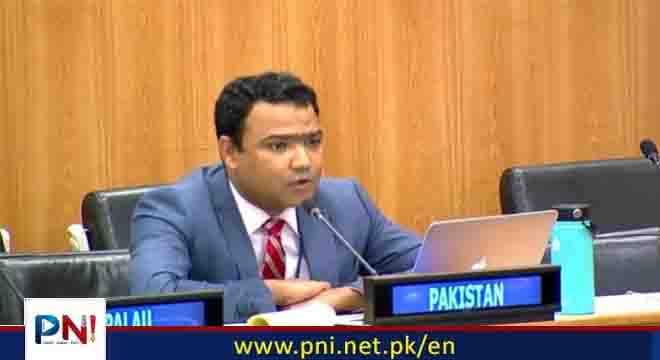UITED NATIONS, Oct 29 : Pakistan has voiced concern over the continued supply advanced weapons and sensitive technologies to one state in South Asia –an obvious reference to India — saying it was fueling instability in the tension-ridden region.
“At a time when the world is besieged by conflicts, when cooperation is most needed to bolster peace-building efforts, some states continue to prioritize financing wars over pursuing peaceful solutions,” Pakistani delegate Gul Qaiser told the General Assembly’s Disarmament and International Security Committee on Monday.
He said that efforts such as the Arms Trade Treaty (ATT) have achieved only limited success in regulating conventional weapons.
“Despite its emphasis on assessing arms transfers based on humanitarian, legal, and security considerations, the reality is stark: advanced weaponry continues to flood volatile regions, often exacerbating disputes and even contributing to atrocities, including genocides,” Qaiser, a Counsellor in Pakistan’s Mission to the UN, said in a debate on Conventional Weapons.
“In South Asia, one State is being supplied with advanced weapons and sensitive technologies leading to destabilizing accumulations despite the fact that it adopts hostile policies towards its neighbours and remains in defiance of multiple UNSC (UN Security Council) resolutions,” the Pakistani delegate added.
“Pakistan, for its part, is committed to the establishment of a strategic restraint regime in South Asia, which includes an element of conventional force balance, “Qaiser said, adding, “Pakistan neither wants, nor is engaged in an arms race in the region.”
He also called for addressing the causes that propel the trade in arms, instead of an exclusive focus on managing its effects.
The success of Convention on Certain Conventional Weapons (CCW), the Pakistani delegate said, lies in the delicate balance it seeks to maintain between humanitarian considerations and the legitimate security interests of States.
Pakistan, he said, shares the concerns about the possibility of acquisition and use of Improvised Explosive Devices (IEDs) by non-state actors and terrorists.
Qaiser said work on Lethal Autonomous Weapon Systems (LAWS), also known as ‘killer robots’, should continue with an aim to develop international rules through a new Protocol that spell out prohibitions and regulations governing autonomous weapon systems to ensure compliance with the International Humanitarian Law (IHL) and consistency with the objectives and purposes of the CCW.
He also called for addressing broader concerns regarding Artificial Intelligence in military capabilities and the use of autonomous weapon systems., saying these issues go beyond IHL and require urgent international attention.
Follow the PNI Facebook page for the latest news and updates.









